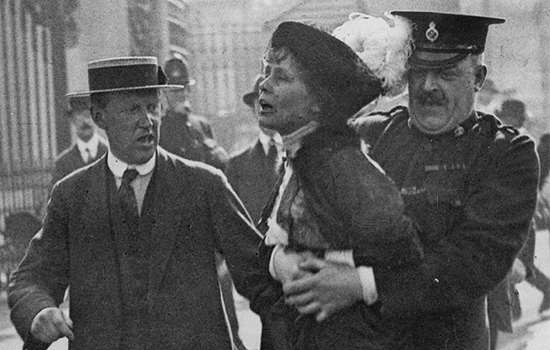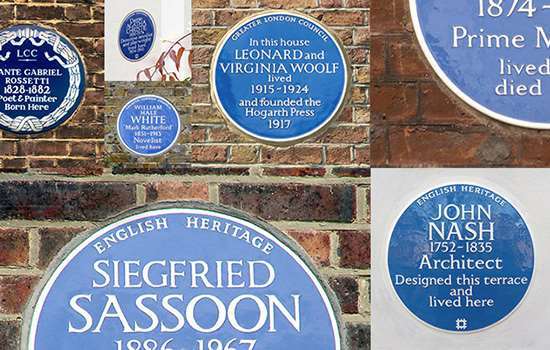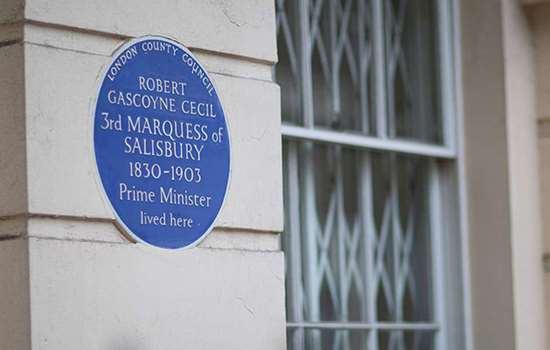MUSSABINI, Scipio Africanus (1867-1927)
Plaque erected in 2012 by English Heritage at 84 Burbage Road, Herne Hill, London, SE24 9HE, London Borough of Southwark
All images © English Heritage
Profession
Athletics Coach, Author
Category
Sport
Inscription
SCIPIO AFRICANUS MUSSABINI 1867-1927 Athletics Coach lived here
Material
Ceramic
Notes
The plaque is smaller (16" diameter) than usual to fit onto the building's façade.
Scipio Africanus ‘Sam’ Mussabini was a pioneering British coach who was generations ahead of his time in his approach to athletics. His systematic and intelligent approach to coaching resulted in his protégés winning a total of 11 medals (including five golds) over five Olympic Games. He was later immortalised in the 1981 film Chariots of Fire.
HERNE HILL STADIUM
Born in Blackheath to a Syrian–Italian father and a French mother, Mussabini was educated in France, but returned to live and work in south London for most of his life. He lived at 84 Burbage Road in Herne Hill from 1911 until about 1916.
The house’s garden would have looked out onto the grounds and banked cycle track of Herne Hill Stadium. It was here that he trained several medal-winning Olympic athletes, working as a cycling and athletics coach at the stadium from the 1890s until his death. His first major coaching success came with the young South African sprinter Reggie Walker, who won a gold medal in the 100 metres at the 1908 London Olympics.
THE GOLDEN YEARS
In 1913 Mussabini was appointed coach to the Polytechnic Harriers at the Herne Hill athletics track, which ran round the inside of the cycle track. Here he trained Albert Hill, Willie Applegarth, Harry Edward and his most celebrated protégé, the 14-year-old Harold Abrahams.
Mussabini’s methods yielded results at the 1920 Olympics in Antwerp, where Albert Hill won gold medals in both the 800 metres and the 1500 metres, and Harry Edward won bronze in the 100 metres. Four years later, at the Paris Olympics, Harold Abrahams won gold in the 100 metres and took silver in the 4 x 100-metre relay.
COACHING LEGACY
Mussabini’s vital role in Abrahams’s success at the 1924 Paris Olympics was depicted in the film Chariots of Fire, where he was portrayed by Sir Ian Holm. Abrahams credited Mussabini with making him ‘improve that decisive one per cent, which made all the difference between supreme success and obscurity’.
Mussabini always refused to call himself a trainer, a person he described as ‘a man who comes on with a bag and a little sponge’, and insisted instead that he was a coach. He examined every aspect of his athletes’ diet, training and racing and adopted a gradual, methodical approach to improve technique, fitness and stamina.
At the Polytechnic Harriers, Mussabini scrutinised his athletes’ running styles, especially stride length and arm action, and encouraged them to use a swinging arm action, which is now known as ‘the Poly swing’. He used a cine-camera to record and study their techniques and insisted that they carry stopwatches in order to learn how to run at an even pace.
Mussabini also helped to ensure more female athletes received high quality coaching, including Vera Palmer-Searle, who set three world records in sprint races in 1923 and 1924. Suffering from diabetes, Mussabini died in March 1927 at the age of 60.
Nearby Blue Plaques
Heroes of the 1924 Olympics
Listen to Episode 274 of the English Heritage Podcast on Heroes of the 1924 Olympics.


